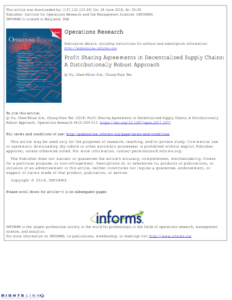How should decentralized supply chains set the profit sharing terms using minimal information on demand and selling price? We develop a distributionally robust Stackelberg game model to address this question. Our framework uses only the first and second moments of the price and demand attributes, and thus can be implemented using only a parsimonious set of parameters.
More specifically, we derive the relationships among the optimal wholesale price set by the supplier, the order decision of the retailer, and the corresponding profit shares of each supply chain partner, based on the information available. Interestingly, in the distributionally robust setting, the correlation between demand and selling price has no bearing on the order decision of the retailer.
This allows us to simplify the solution structure of the profit sharing agreement problem dramatically. Moreover, the result can be used to recover the optimal selling price when the mean demand is a linear function of the selling price (cf. Raza 2014) [Raza SA (2014)
A distribution free approach to news vendor problem with pricing. 4OR—A Quart. J. Oper. Res. 12(4):335—358.].


